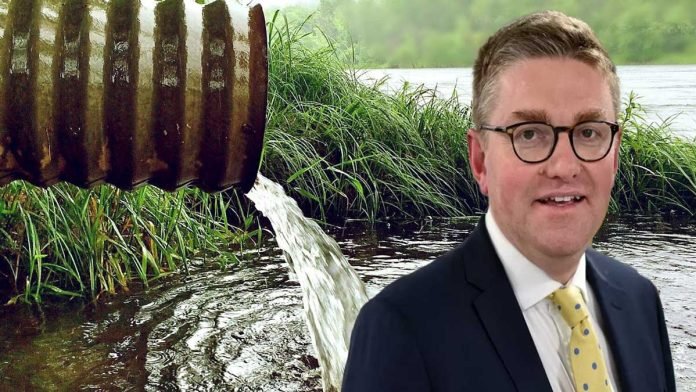The Troubled Waters: Monopoly Companies and the Exploitation of Privatised Resources
In a country where The reservoirs of profit flow freely, but the rivers of clean water remain choked with excrement, negligence and avarice we see how Monopoly resources, in this case, water have been nothing more than wells of riches for companies, who armed with exclusive control over our vital resources, have been plunging consumers into a deep pool of debt, with their poor performance, and environmental negligence.
As the boss of regulator Ofwat, David Black, struggles to defend the industry’s reputation, he admits that higher bills loom on the horizon, intensifying the waves of discontent. It’s a tale of swollen dividends, executive excess, and sewage pollution, all under the guise of a poorly regulated industry. But who bears the weight of this watery burden? Let us dive into the depths of this monopoly exploitation and expose the current state of affairs.
It starts with the wonders of privatisation. What better way to turn a vital resource like water into a playground for profit-hungry monopolies? Welcome to the murky world of the UK’s water industry, where executives bathe in dividends, pollution flows freely, and consumers are left to foot the bill.
Amidst revelations that water companies are poised to push for exorbitant bill increases starting in 2025, as revealed by the chief of regulator Ofwat, one cannot help but question why we, the beleaguered consumers, are left grappling with the remnants of a crumbling industry. It seems that while profits gush unimpeded, the much-needed investment in the water sector has been shamefully overlooked, draining away like a stagnant pool of neglect.
As an economic regulator, Ofwat bears a weighty responsibility in fulfilling its mandated duties. According to the Water Industry Act 1991, amended under section 2, the primary objectives of Ofwat are manifold: to safeguard the interests of consumers, foster effective competition where appropriate, ensure that water companies fulfil their statutory obligations, facilitate the financial stability of water companies through reasonable returns on their capital, monitor the proper conduct of water supply and sewerage licensees, and prioritize the long-term resilience of water supply and wastewater systems to meet future demands. These duties encapsulate the core pillars of Ofwat’s regulatory framework.
For most, it is clear they have failed spectacle in their duty to the public. However, David Black denies that the water industry is poorly regulated. The evidence speaks for itself. With a staggering £60 billion of debt burdening privatised water firms, it’s clear that something has gone horribly wrong. Thames Water, in particular, finds itself drowning in debt, with the highest gearing in the industry. Yet, according to Black, this colossal debt is merely “their issue to sort out.” How convenient.
Yet, Thames Water, the poster child for water company woes, is on the verge of a financial collapse. The company, seeking billions from shareholders to secure its future, faces the grim possibility of special administration—a temporary re-nationalisation of sorts. However, Black assures us that this doomsday scenario is still a long way off. Thames Water is left scrambling for solutions, desperately seeking investors to inject equity into the struggling business. The irony is palpable as investors show a distinct lack of enthusiasm for pouring their money into a sinking ship.
Last week it emerged that Thames Water was struggling to raise the money it needs to service its huge £14bn debt pile.
The firm, which supplies a quarter of the UK population, has faced heavy criticism over sewage discharges and leaks and is under pressure to improve services.
If Thames cannot raise the money it could be put into a “special administration regime” – where it would be temporarily re-nationalised – although Mr Black said this remained a “backstop option” and “we’re still a long way from that”.
He said Thames had until the “early part of next year” to find the money and currently had £4.2bn cash reserves.
Asked if customers would have to pick up the tab if the company went bust, he responded: “No.”
An Ofwat spokesperson also told the BBC that there are no similarities with the collapse of Bulb – the energy company which went under last year costing the taxpayer millions.
“This is not a Bulb moment, there is no switch on, switch off here,” they said.
So here’s the kicker—the burden of rescuing Thames Water falls on the taxpayers. If the company fails to secure funding, it is the ordinary citizens who will bear the weight of its mismanagement. The very same consumers who have been paying for decades to ensure environmental services are now being asked to rescue an industry marred by greed and negligence.
The depths of this dire situation leave us questioning its origins. David Black lays the blame, on the deficiency of regulatory powers, a consequence of the industry’s privatisation over three decades ago, that has led us to this precipice.
Black told peers the regulator should have stepped in in 2006 to stop companies as they began taking on huge levels of debt but did not have the powers to do so at the time.
“We now have the powers and we have used those,” said Black, referring to new powers in 2021 under which the regulator says it will stop water companies paying dividends if doing so would harm their financial resilience and stop companies paying bonuses to executives.
It has to be asked, why wait till the ship is sinking to yell iceberg…if the regulatory body had the powers in 2021 why not use them then? This apparent lack of oversight has provided an open invitation for companies to operate with reckless abandon, placing exorbitant executive salaries, colossal dividend payouts, and abysmal performance above the well-being of consumers. Leakage levels reach staggering heights, while pollution seeps into our rivers and waters. Meanwhile, consumers find themselves grappling with inflated bills and an alarming deterioration in service quality.
It’s as if they finally discovered the essence of their job, albeit a bit late in the game.
The water industry, once a public service, has become a bottomless well of corporate greed, leaving consumers stranded on the parched shores of exorbitant bills.
Paul knaggs
A Thirst for Profit: How Monopoly Water Companies Drain Consumers’ Wallets

Of course, Mr Black insists that customer bills are likely to rise. After all, how else can water companies fund their grand plans for improvement? Brace yourselves for the familiar narrative of “investment” and “environmental progress” as justification for emptying your pockets further. It seems the solution to their mismanagement is to squeeze even more from the hardworking public.
Sewage, Leaks, and Dividends
Water UK, the supposed representative of these suppliers, dismisses any responsibility for price increases, conveniently placing the burden on the regulator. Meanwhile, campaign group Surfers Against Sewage rightly expresses outrage at the prospect of consumers shouldering the consequences of water company malpractice. Why should the public bear the brunt while these companies continue to divert funds into shareholders’ pockets?
As water companies demand more from our pockets, they present it as a necessary dive into progress, while consumers are left treading water in the deep end of financial distress.
Paul knaggs
Let us not forget that the privatisation of the water industry was touted as a means to improve efficiency and deliver better services. Yet, what we have witnessed is an industry plagued by debt, pollution, and inadequate regulation. The promises of a utopian water market have evaporated like droplets under the scorching sun.
Former Environment Secretary George Eustice downplays the potential impact, claiming that bill increases will be “far lower” than anticipated. But forgive me for my scepticism. We’ve heard such assurances before, only to find ourselves drowning in ever-rising bills. It seems the cost of improvement always falls on the shoulders of the consumers, while executives and shareholders bask in the profits.
The truth is that taxpayers are being exposed to the risks and costs of mismanaged water companies. If the government steps in to take control, the financial burden will inevitably be shouldered by the public. It’s a bitter irony that we pay for the services we expect, only to be left scrambling to rescue a failing industry.
So, where does the blame lie? Ofwat, the supposedly vigilant regulator, claims it lacked the necessary powers to prevent water companies from spiralling into insurmountable debt. But the question remains—why was this not addressed earlier? It seems we are always playing catch-up, as the consequences of inadequate regulation reveal themselves too late.
As we approach the business plans submission deadline for 2025-2030, water companies must be held accountable. Their improvement works and investment plans should not be funded by an already burdened public. The burden should fall squarely on the companies themselves, as they seek to rectify the mess they have created.
The water industry teeters on a precipice of profound significance. Will it persist on the treacherous road of avarice and disregard, or will it finally awaken to its profound obligation of delivering accessible, ecologically sound, and impeccable water services?
We firmly believe that the time has arrived for a seismic transformation, a revolutionary shift where consumers are no longer viewed as mere profit fodder for the enrichment of executives and shareholders. Our unequivocal opinion lies in the nationalisation of this monopolistic resource, fortified by resolute legislation that safeguards our invaluable natural reserves from the clutches of rapacious oligarchies, ensuring an eternal safeguard against their insatiable greed.
The future of our water supply depends on the decisions we make today. Let us demand transparency, robust regulation, and a fair distribution of costs. Our voices must rise above the flood of indifference, for it is our right to have access to clean water without bearing the burdens of a broken system.
The struggle for water justice begins with recognising that the thirst for profit must not drown the collective welfare. It is a battle we must win to ensure the rivers of accountability flow freely, cleansing the murky depths of monopoly exploitation.
Support Independent Journalism Today
Our unwavering dedication is to provide you with unbiased news, diverse perspectives, and insightful opinions. We're on a mission to ensure that those in positions of power are held accountable for their actions, but we can't do it alone. Labour Heartlands is primarily funded by me, Paul Knaggs, and by the generous contributions of readers like you. Your donations keep us going and help us uphold the principles of independent journalism. Join us in our quest for truth, transparency, and accountability – donate today and be a part of our mission!
Like everyone else, we're facing challenges, and we need your help to stay online and continue providing crucial journalism. Every contribution, no matter how small, goes a long way in helping us thrive. By becoming one of our donors, you become a vital part of our mission to uncover the truth and uphold the values of democracy.
While we maintain our independence from political affiliations, we stand united against corruption, injustice, and the erosion of free speech, truth, and democracy. We believe in the power of accurate information in a democracy, and we consider facts non-negotiable.
Your support, no matter the amount, can make a significant impact. Together, we can make a difference and continue our journey toward a more informed and just society.
Thank you for supporting Labour Heartlands












